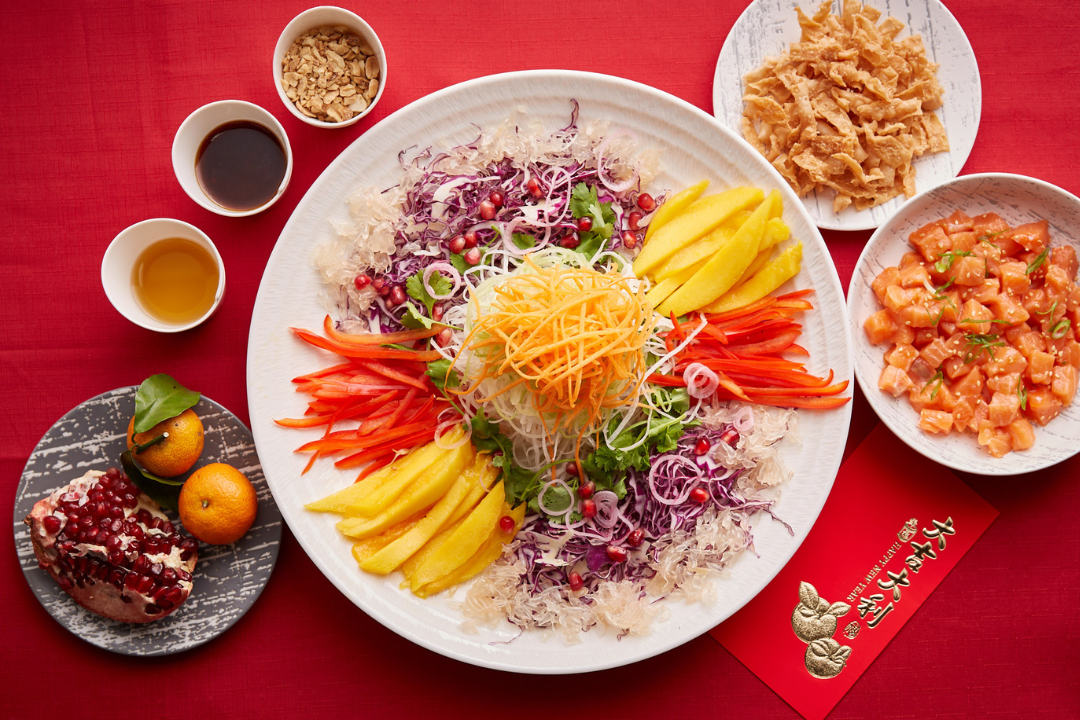Yusheng, also referred to as "Lo Hei" in Cantonese, holds deep-rooted traditions as a Chinese New Year delicacy. Read on to learn more about Yu Sheng as a popular Chinese New year tradition in Singapore.
The History of Yusheng
Originating over 2,000 years ago in China, a simple dish of raw fish slices, can be traced back to 823 BCE during the Zhou dynasty. Its popularity soared, prompting poets to extol its virtues.

Photo by: Chinese History Digest
Yusheng in Singapore
Years later, this dish of raw fish became ‘Yu Sheng’ with the addition of herbs, spices and other ingredients. Head chef of the iconic Lai Wah restaurant, Tham Yu Kai, driven by a vision of creating a simple yet universally appealing dish, unexpectedly birthed a cultural sensation in the 1950s. Originally envisioning a simple dish featuring raw fish slices with ginger, chili, and lime, Tham's innovation took an auspicious turn. "Yu," symbolizing fish and abundance, and "sheng," representing raw and life, formed the perfect moniker for this dish. The tradition of lo hei at the restaurant emerged as customers requested the waitstaff to introduce individual ingredients in the yusheng, attaching an auspicious greeting to each one. The diners would then toss the ingredients together. As one of Singapore's esteemed "Four Heavenly Culinary Kings," Tham Yu Kai unintentionally crafted a dish that today, is a Lunar New Year essential.

Photo by: Mothership.SG
Symbolic Yusheng Ingredients
Symbolizing abundance, prosperity, and good fortune, a traditional Yusheng meticulously incorporates various ingredients with symbolic meanings. The fish slices represent abundance for the upcoming year. Pomelo shreds and shredded carrots symbolize good luck and prosperity, while golden ground peanuts, deep-fried flour crisps, and a dash of oil are linked to wealth and profits. Shredded green radish embodies the concept of youthful beauty, honey drizzle signifies sweetness and bliss, and a touch of lime along with a sprinkle of five-spiced powder symbolizes blessings for everyone present.
Meaning of 'Yu Sheng'
This dish is deemed auspicious because of the homonymic meanings behind its ingredients, which suggest blessings and good fortune for the new year: yu is a homonym for “fish” and “abundance”, while sheng means both “raw” and “life”. Together, yusheng implies “abundance of wealth and long life”.
What to say (or shout) during lo hei?
During the "lo hei" ceremony, diners engage in a tossing ritual, using chopsticks to mix the ingredients while shouting auspicious phrases such as '年年有余' (nián nián yǒuyú), translating to "Abundance throughout the year," and '大吉大利' (dà jí dà lì), conveying "Good luck and great prosperity." This act symbolizes the uplifting of good luck and prosperity for the upcoming year. The higher the toss, the more prosperous the coming year is believed to be.
Today, yusheng has become an integral part of the Chinese New Year reunion dinner, and its popularity has expanded beyond Singapore to other Chinese communities around the world.

Photo by: Channel News Asia
Prosperity Poké Yu Sheng
As the Lunar New Year approaches, the excitement builds up for the festive celebrations that mark the beginning of a prosperous year ahead. At All Things Delicious, our version of this classic dish is made with all-natural ingredients, starting with our Hawaiian-inspired sashimi-grade raw Salmon Poké. In addition to spiralized carrots and radish, this yusheng includes fresh mangoes, pomelo, pomegranate seeds and an amazing housemade sesame dressing. This signature Yu Sheng continues to be an All Things Delicious best-seller every Chinese New Year. Ours is tradition with a twist - HUAT AH!




